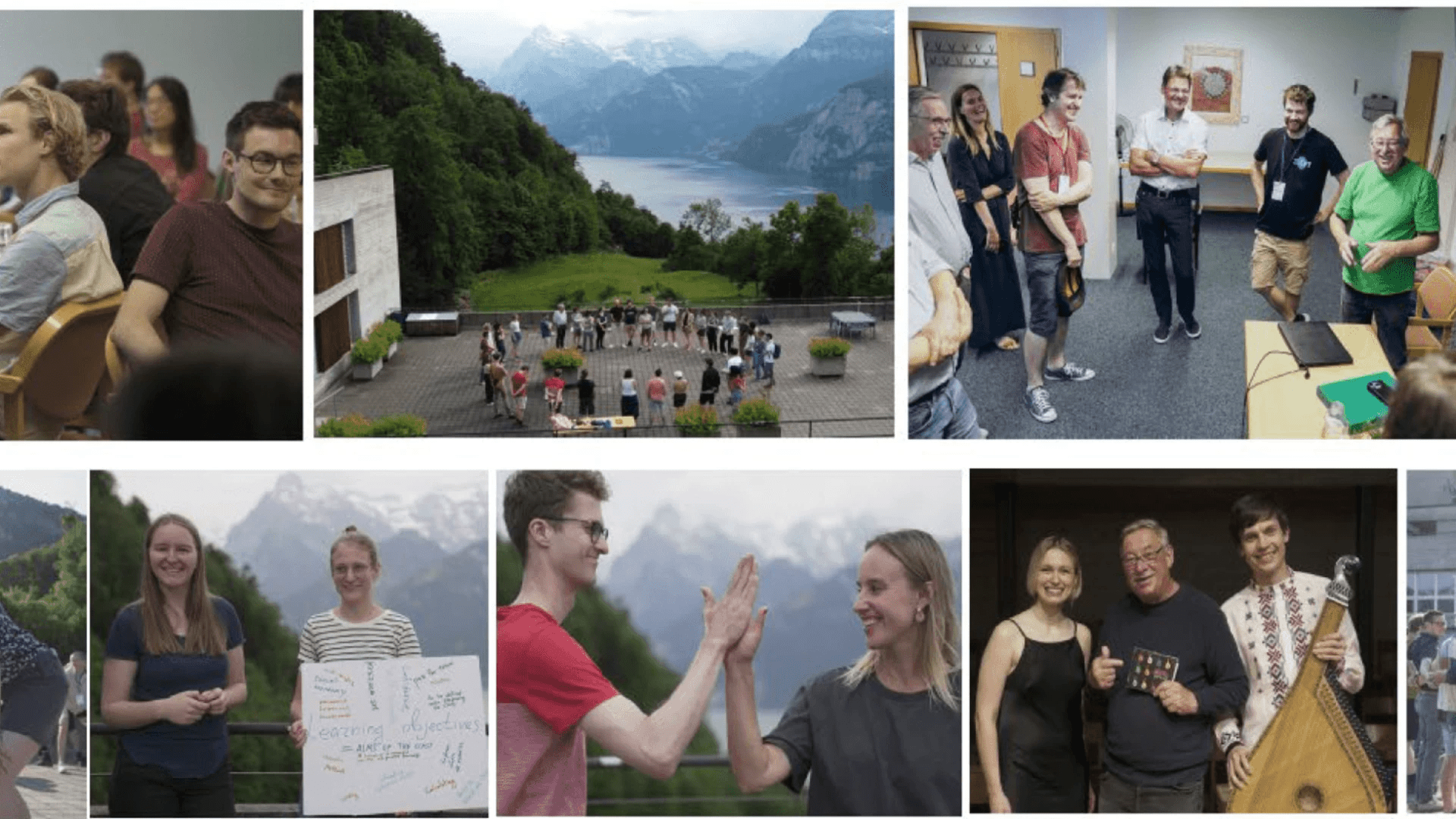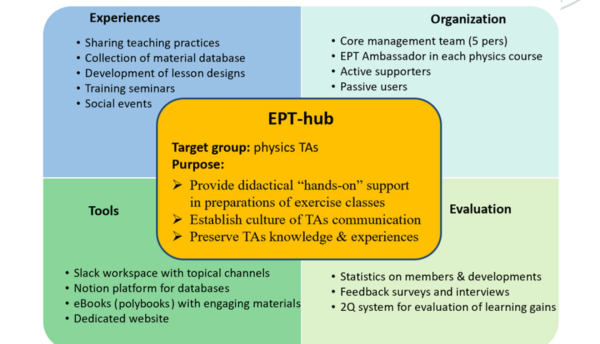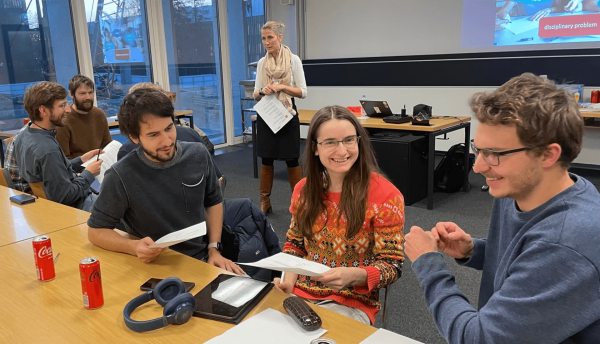EPT-hub: Engaging Physics Tutoring
ETH Zurich's EPT-hub initiative is reshaping the landscape of physics education for over 3,500 Bachelor and 100 doctoral students. Going beyond traditional models, EPT-hub is a community platform supporting Teaching Assistants (TAs) in their roles. The initiative focuses on making teaching joyful, promoting active learning, and developing TAs' professional competencies.

Introduction to EPT-hub
EPT-hub (Engaging Physics Tutorials) is designed as a community platform that supports Teaching Assistants (TAs) in their teaching duties and fosters their professional teaching development. The major goals of this initiative are to:
- make teaching a joyful and rewarding experience for the TAs,
- promote active learning elements in classes held by TAs,
- enable TAs to share their teaching experiences and gain self-confidence,
- promote teaching-related professional competencies, such as presentation skills, time management, and well-being.
As a result, students are experiencing effective and meaningful learning in classes taught by TAs, which is also largely supported by research.
Implementation Strategy of EPT-hub
To achieve these ambitious goals, we have implemented the following strategy, which is based on extensive interviews with students, TAs, and lecturers:
- Supply TAs with task-focused teaching material, that can either be used directly by novice TAs or provide a stimulus for more experienced TAs.
- Offer selected and time-wise effective inputs on general topics related to teaching, including professional development.
- Collect all materials developed by TAs in a tagged database, where it is categorized and can easily be retrieved.
- Offer communication channels and community events, where TAs gain self-confidence by exchanging and sharing their teaching experience.
Teaching materials
Within the last two years, we have worked out high-quality teaching material sets targeted at five different introductory courses that can be used by TAs in each of their classes. These ready-to-use tutorials are available as eBooks. Their focus is on active learning, including advanced organizers, concept questions, case-based calculation examples, and hands-on experiments.
Community-Building and training opportunities
The more TAs start to use the tutorials, the more they discuss their teaching experience and eventually begin to design new teaching material or refine the available material. TAs share their developed teaching resources such as notes, slides, and exercises, all valuable material that would otherwise be lost.
We collect these items and transfer them to a tagged database on the Notion platform. Here TAs can search for relevant resources by using keywords or classifiers. This web-based system proves to be very convenient to store teaching-related items and to make them available to future TAs. Apart from these online activities, we are offering in-person seminars that cover pedagogical topics (student activation, class management, etc.) and professional skills (time management, well-being, etc.). Finally, we are organizing a yearly three-day summer camp. The summer camp includes many opportunities for personal exchange and features workshops on innovative teaching and professional development, that are mainly given by international experts.
Evaluation and Measurement of Learning Gains
To measure achievements at the lesson level, we have developed a 2Q assessment system that monitors the learning gains and gives immediate feedback to the TAs and to the students. The 2Q system consists of two specially designed multiple-choice questions that are presented right at the beginning of the class (pre-test) and repeated at the end (post-test). These questions are based on key learning objectives of the corresponding lesson and aim to probe the higher-level competencies of the students. The answers to the pre-lesson test are not revealed and at the end of the lesson, after the same two questions have been asked again, a discussion and comparison of the answers is started. By means of the 2Q system, students as well as TAs can easily evaluate the learning progress.
Impact and Feedback
For introductory courses, student’s performance is measured by final exams that take place a couple of months after the last lecture. This situation makes it extremely difficult to consistently measure the impact of EPT-hub on learning achievements. However, we see good exam performance of students from classes of TAs from EPT-hub, even though we cannot confidently link these exam results to EPT-hub. We also collected feedback from students attending classes supervised by TAs from the EPT-hub and those TAs received very high rates in all aspects of teaching. Positive feedback from lecturers of the corresponding courses, together with feedback from the TAs themselves, show clear evidence for the success of EPT-hub.
To summarize, based on the material provided by EPT-hub TAs were highly successful in offering engaging and interactive classes. In combination with the additional EPT-hub community-building elements and training opportunities, TAs continuously gained teaching expertise and experienced teaching as a rewarding task. We have good evidence to believe that all our major goals defined above have been accomplished.


Question:
Which methods, tools or strategies did you use to encourage student engagement for learning success?
Answer:
We were guided by the famous quote from John Hattie “What teachers do matters” (Hattie, Visible Learning, 2009, p. 22). By providing TAs with proven ready-to-use teaching material, still leaving them room for personal development, by making them self-confident about their teaching role, and finally by offering them opportunities to hold collaborative discussions with colleagues and students, we have laid the ground for highly interactive and effective exercise classes. Students are engaged and accomplish the overarching learning goal of exercise classes, namely that they are able to apply the theory from the lecture to practical problems.
Question:
What is the innovative element of your course?
Answer:
By reviewing different models of TA training and based on extensive interviews with students, TAs, and lecturers, we came up with EPT-hub which is to our knowledge a completely new approach. See the attached paper (Bondar et al. 2023) for further details.
Question:
How did you ensure (continuous) feedback on student learning progress?
Answer:
Assessment of the EPT performance on TAs includes surveys on:
- the students’ learning progress,
- the efficiency in preparation and supervision of the exercise classes,
- the general impressions and transferability of knowledge gained from the teaching/learning experiences in the class and during EPT events.
Student feedback was collected by surveys from:
- ETH teaching evaluation,
- VMP (Physics and Mathematics student organization),
- TAs on their own classes.
Student's continuous learning process was measured in focus groups by the 2Q Assessment system.

Project team
Inst. f. Teilchen- und Astrophysik
Otto-Stern-Weg 5
8093
Zürich
Switzerland

Laboratorium für Festkörperphysik
Wolfgang-Pauli-Str. 27
8093
Zürich
Switzerland

Mechatronische Systeme
Physikstrasse 3
8092
Zürich
Switzerland
